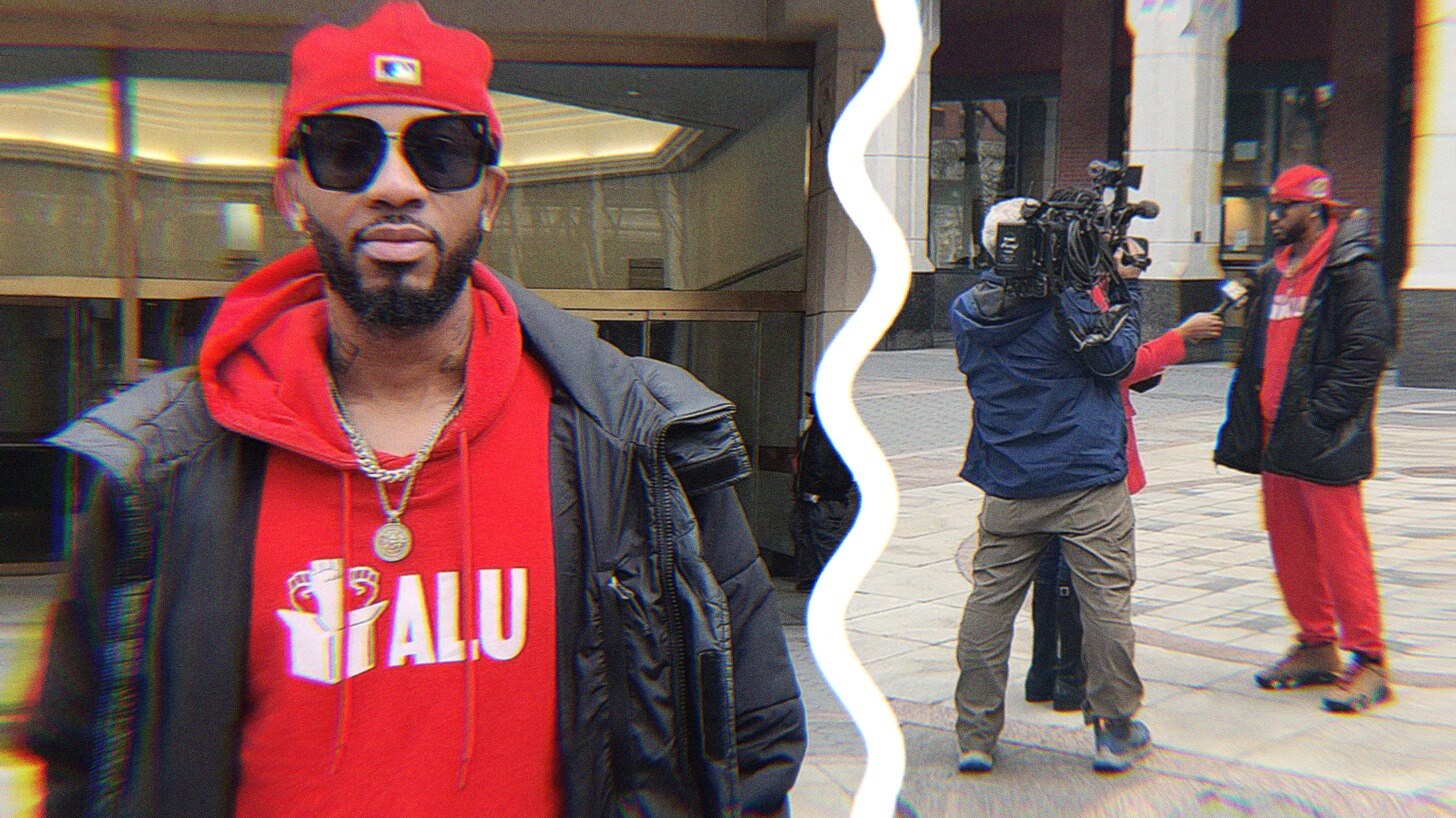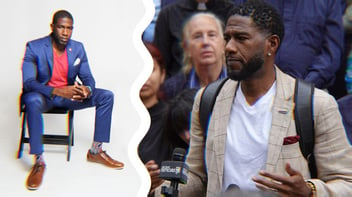Progressive Spotlight: Christian Smalls.
Fighting for the Right to Organize.
 Image Description: Two photos of Christian Smalls wearing a red Amazon Labor Union hoodie.
Image Description: Two photos of Christian Smalls wearing a red Amazon Labor Union hoodie.
Speaking at a Senate Banking Committee hearing in May 2022—one month after shocking the country with one of the most improbable labor victories in generations—Christian Smalls realized he had to quickly diverge from his prepared remarks.
Inside the belly of the beast, Smalls, who had just taken on the behemoth that is Amazon, was not going to back down.
“First of all, I want to address Mr. Graham,” Smalls, the president of the Amazon Labor Union (ALU), told the assembled committee, referring to U.S. Sen. Lindsey Graham (R-SC).
Graham, who in his last election cycle reportedly received the highest percentage of campaign money from donors with incomplete disclosures, had dedicated his opening remarks to criticizing the committee’s chairperson, Sen. Bernie Sanders (I-VT), for being hostile toward obscenely wealthy corporations.
“You are singling out a single company because of your political agenda to socialize the country. Every time I turn around, you are having a hearing about anybody that makes money is bad,” Graham, who amassed a nearly $105 million campaign war chest in 2020, told Sanders, who very well may have taken that diatribe as a compliment.
Not that Sanders requires anyone to come to his defense, but Smalls stepped in anyway. In true Smalls fashion, however, he spoke out on behalf of often maligned workers in the United States—and not for any perceived slights in his or Sanders’ direction.
“You forgot that the people are the ones who make these companies operate,” he shot back at the senator. “And if we’re not protected, and if the process for when we hold these companies accountable is not working for us—that’s the reason why we’re here today, that’s the reason why I’m here, to represent the workers who make these companies go.”
And that’s Christian Smalls in a nutshell.
The new-age labor leader and the outfit he represents, ALU, took the nation by storm in April 2022 when workers at an Amazon fulfillment center in Staten Island, NY, known as JFK8, voted to unionize. It marked a historic victory against one of the world’s most influential companies—one that’s staunchly opposed to organizing efforts. Underscoring how miraculous the accomplishment was, the workers effectively took on Goliath without the support of an umbrella labor group, which is generally preferred. Their collective struggle was genuinely grassroots—and Smalls emerged as the leader.
The union effort came two years after Amazon went on a hiring binge during the COVID-19 pandemic—also a necessity because of high turnover at the company, done by design—and also confronted complaints of demanding conditions, such as monitoring employee activity and workers having to skip bathroom breaks to avoid being penalized, among others. A study by the University of Illinois Chicago’s Center for Urban Economic Development (CUED) last year found that the demanding work requirements hurt workers, with 41 percent reporting having suffered an on-the-job injury.
Just this month, regulators in California said the company violated so-called Warehouse Quote Laws more than 59,000 times at two warehouses in the state. In January 2023, the Department of Labor’s Occupational Safety and Health Administration (OSHA) cited Amazon for several safety-related violations that threatened the safety of workers.
“While Amazon has developed impressive systems to make sure its customers’ orders are shipped efficiently and quickly, the company has failed to show the same level of commitment to protecting the safety and well-being of its workers,” an OSHA official said last year.
Smalls himself was fired from Amazon just weeks into the pandemic after organizing a protest for better safety conditions—though the company claimed Smalls’ dismissal was in response to his violation of COVID-19 quarantine policies.
The company’s justification for firing Smalls came into further question when notes from an internal meeting leaked in which Amazon’s general counsel reportedly referred to Smalls as “not smart or articulate,” and went as far as suggesting he wouldn’t be well received by the public.
“[T]o the extent the press wants to focus on us versus him, we will be in a much stronger PR position than simply explaining for the umpteenth time how we’re trying to protect workers,” the Amazon lawyer said.
Talk about a major miscalculation on Amazon’s part.
Smalls and others formed the Amazon Labor Union one year later, sending organizing efforts at JFK8 into high gear. Amazon tried to engage in the time-tested corporate strategy of union busting, which a federal administrative judge later said violated federal labor law. According to the National Labor Relations Board (NLRB), Amazon “unlawfully interrogated employees, disparaged the Union by using appeals to racial prejudice and derogatory racial stereotyping, and prohibited employees from distributing Union literature and confiscating Union literature from employees.”
Despite the anti-union tactics, JFK8 workers voted to unionize in April 2022.
“We want to thank Jeff Bezos for going to space, because while he was up there we were organizing a union,” Smalls said after the ALU’s victory was confirmed.
Two years later, JFK8 workers remain without a contract and ALU has been unable to organize at other Amazon locations throughout the country successfully.
The union remains undeterred. After three years of operating independently, ALU this month voted to join forces with the International Brotherhood of Teamsters, which they hope will build momentum for that elusive contract at JFK8 and support organizing campaigns elsewhere.
“Having the support of 1.3 million Teamsters to take on Amazon gives us tremendous worker power and the opportunities to demand better conditions for our members and, most importantly, to secure a contract at JFK8,” Smalls said in response to the approved Teamsters alliance.
The agreement also reportedly includes an $8 million commitment by the Teamsters directed toward Amazon organizing efforts, The New York Times reported.
Smalls, for his part, remains the face of ALU, propelling him to national prominence at a time of renewed labor relevance. It’s allowed him to speak out about a range of issues relevant to the progressive cause, but he remains committed to the fight for workers’ rights. What else would expect from someone who had the confidence to wear a jacket to the White House emblazoned with the popular phrase, “Eat the rich”?
Image Sources
- Legoktm, CC BY-SA 4.0, via Wikimedia Commons. Changes were made.
- Legoktm, CC BY-SA 4.0, via Wikimedia Commons. Changes were made.
Rashed Mian is the managing editor of the award-winning News Beat podcast and co-founder of the newly launched Free The Press (FTP) Substack newsletter. Throughout his career, he has reported on a wide range of issues, with a particular focus on civil liberties, systemic injustice and U.S. hegemony. You can find Rashed on X @rashedmian and on Bluesky @rashedmian.bsky.social.


